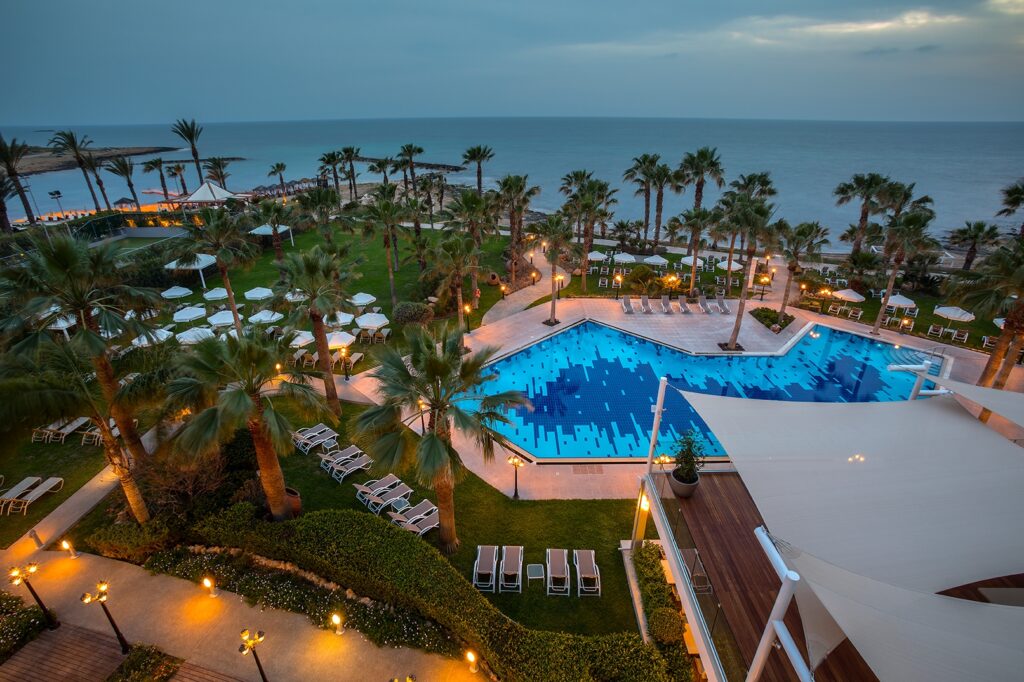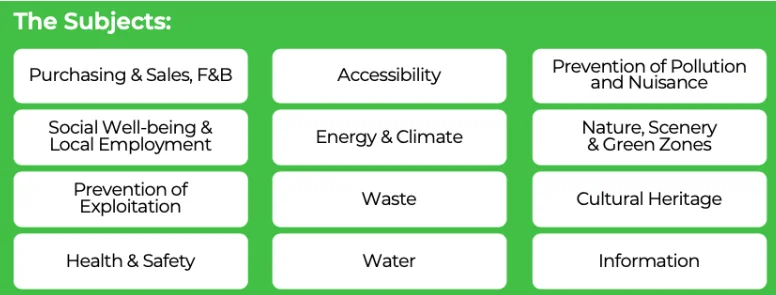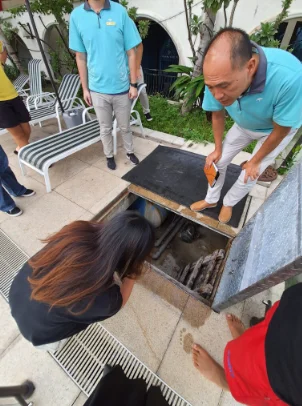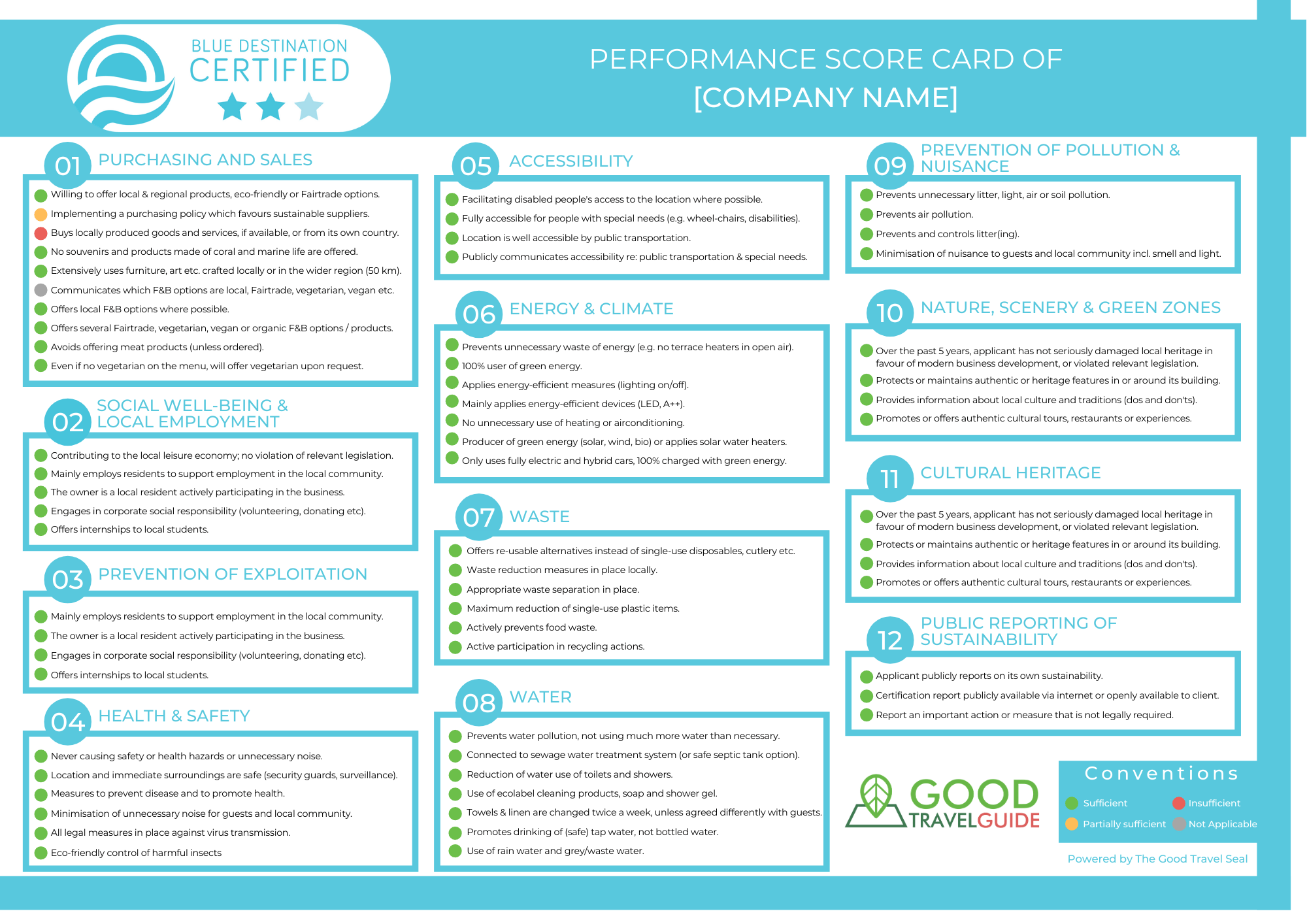
Ken Drew
© Good Travel Guide, November 2022
8 min to read
There is no world police to punish countries for allowing local businesses to take fresh water away from locals so that tourists can have a half-hour-long steamy shower. There’s no penalty for toilet and sink water to be flushed out to beaches and rivers where tourists snorkel. And what about all of the climate-changing fossil fuels needed to generate electricity for heating, cooling, and lighting at hotels?
Eco-Labels are supposed to change all of that by creating jobs for people who teach and certify hotels, tour operators, and governments how to “go green” so that they can use an eco-sticker or eco-label to attract travelers who care about the planet. It’s assumed creating a new profitable industry around earth-friendly tourism business practices will influence the tourism industry to operate their businesses in a way that preserves cultures, protects nature, reduces climate change, and more!
Unfortunately, where there is money, there is dishonesty. It’s not just hotels advertising fake environmental claims but the entire sustainable tourism industry is a mess! There’s competition between honest and greedy businesses. In this article, you’ll learn how to find the good ones which depend on knowing about scorecards and what to look for in them. This is a complex topic, so a travel industry special guest will help me explain more about it!
How To Find Sustainable Accommodations
There’s no easy way to say this – finding a legitimate eco-hotel requires YOU to have a foundation of sustainable certification industry knowledge because the industry is not anchored down by any government agency.
To be blunt – you can’t trust all eco-certifications. Think of it like health. You must know about calories and carbs and understand your limits if you want to lose weight. A fast-food restaurant can promote their artery-clogging burgers as being healthy because they are a high source of protein. That’s a half-truth. While you need proteins, you don’t need excessive amounts of saturated fats, thousands of empty calories, or harmful food additives.
As we book eco-hotels with environment seals from so-called world-class standards, we are putting out trust in those parties, to be honest. Without knowing the “nutrition facts” for hotels, destinations, and tour companies, they can say anything they want to persuade you to book with them.
For example, a hotel with locally sourced food sounds “sustainable”, but what if that food comes excessively wrapped in single-use plastics which are later burned on site in the evening? Should they be given an eco-label for their online marketing when they don’t have any waste management and when their waste management exposes guests to cancer-causing chemicals?
Amanda Lambert from Australia was a victim of greenwashing. She commented on a tourism website that “[Eco-Labels] is meaningless.” Frustrated, she explains further, “I am sorry to say. Businesses that really want to make a difference will do it anyway; others will just pay the money to get the label. The consumer in the middle knows very little of what they mean anyway.”
Sustainable tourism expert Albert Salman from Green Destination agrees. He says “providing full transparency is – apart from sustainability performance in practice – the single most important condition for hotels to be truly reliable – a true eco-hotel. Transparency means that travelers can understand the results of the audit (e.g. What the hotels are doing really well).”
Travelers can avoid greenwashing by reading this blog all the way through. You’ll learn the basics: Just three industry terms:
1. Scorecards
2. ETC (eco-tourism criteria), and
3. ETCOB (eco-tourism certifying organizations and/or businesses)
AUTHOR’S NOTE: I made up these acronyms to teach you about the industry. The industry uses the term Certification Bodies “CB” to describe organizations or businesses that have the authority to give eco-certificates to tourism businesses. I think the noun “bodies” is too vague for you and that ETCOB is more descriptive. I’ll use it throughout this article.
We can’t only hold hotels accountable for false claims. Blame must be shared with all parties involved in scamming good travelers. It’s easy to get scammed because there are businesses and organizations that don’t rigorously audit hotels and resorts and who don’t grade those hotels or resorts on what matters most to reduce climate change.
I imagine that akin to a teacher letting a failing student pass their exam because “It’s easier” or “ I don’t want to deal with his/her parents again.” The grading of hotels on their “greenness” thus needs to be done by quality-committed independent 3rd-parties – meaning an ETCOB who is not affiliated with the gov’t or any industry personnel within the tourism industry of the hotel/tour operator that’s being audited. With that said, let’s find you a good eco-hotel!
First, let’s learn some wallet-saving planet-protecting eco-vocabulary starting with “criteria”.
1. ECO TOURISM CRITERIA (ETC): How “Greenness” Is Measured
Criteria, or guidelines, are standards that a business or government needs to meet in order to be considered “sustainable”. Criteria are created by the Global Sustainable Tourism Council.
It was in 2007 when departments within the United Nations called for a council to create universal, globally accepted criteria.
Two Main Types of ETC
There are two different lists of criteria. One for tourism businesses (industry) and another one for places (destinations). It doesn’t stop there! There are sub-categories for each category that we at the Good Travel Guide call “subjects”.

Image credit: Good Travel Guide
There are different subjects for each sub-industry. The subjects of ETC that hotels have to satisfy to be considered “green” is different from what tour companies are required to do. Makes sense right? Consider electricity usage for example it wouldn’t make sense to have a snorkeling company’s boat meet strict energy-saving lighting standards.
The Goals of ETC
Criteria were intended to provide the following benefits according to the GSTC (but results in the real world differ):
- Inform destinations and businesses what they need to do to be considered “sustainable”
- Help good travelers like you figure out which places are “green”
- Serve as a common denominator for information media to recognize destinations and inform the public regarding their sustainability
- Help certification and other voluntary destination-level programs ensure that their standards meet a broadly-accepted baseline
- Offer governmental, non-governmental, and private sector programs a starting point for developing sustainable tourism requirements
- Serve as basic guidelines for education and training bodies, such as hotel schools and universities
2. ECO TOURISM CERTIFYING ORGANIZATIONS AND/OR BUSINESSES (ETCOB): The Freelance Teachers of Eco-Labels
Teachers develop students’ intellect, grade their work, and post the results of their work on a report card. This is kinda what the tourism industry does. Businesses, City Government and Tour Operators are the students and are supposed to be taught what they need to do to “pass the class” and get a certificate.
No one magically knows how to be a teacher. You need training. The ETCOBs should have a thorough understanding of the GSTC’s criteria among other things. That’s how ETCOB’s become accredited to audit and award their uniquely named ETC to destinations, hotels, or tour companies.

At the Good Travel Guide, there are tiers of ETC packages. Some hotels can be audited from a video call while others require us to inspect them.
In this picture, which you can see on our website, an auditor from Sustainable Travel Taiwan (STT) is doing on-site business audits for our ETC Green Travel Seal.
If the hotel passes our rigorous ‘fine-tooth comb’ inspection, they’ll be awarded the Good Travel Seal.
It’s important for travelers to know how sustainable a hotel is so we make it easy with star ratings: 1 to 5 stars.
There are many good ETCOB’s but there are also not-so-good ones. As with all industries, there’s money to be made and when that happens, some good hotel owners become victims which can lead to unintentional greenwashing.
In the experience of tourism business owner Navyo Eller (Nepal), he was certified by a less than honest eco-assessor who will remain anonymous:
“We adhered to two different labels. You fill in the form, you pay, and get the eco-label, but no one comes to check… I’m sure not all are like this, but clearly, not all labels are trustworthy.”
– Navyo Eller, Nepal-Based Tourism Business Owner
When ETCOBs don’t do their job, they aren’t just disappointing travelers and future generations of the human race in a climate-changed world, they are also letting down the hotel owners who want their businesses to be environmentally-friendly.
Don’t be a victim of Greenwashing. Make sure Eco-Labels Came From Independent 3rd parties.
Some ETCOBs may have connections to the government or tourism industry. When this happens, some criteria can be overlooked and some claims can be half-truths or full-out lies.
This is why at the Good Travel Guide, transparency or “Due Diligence” is extremely important.
To prevent travelers from being victims of greenwashing, there must be full transparency into not only which criteria the hotel satisfies, but also information as to who graded the hotel.
It’s not easy to be a good traveler, but it is rewarding when you put in the work and share your story with others. That’s why people like us are called eco-warriors – we fight for a better planet. If you are too tired to fight, an easier way of finding green hotels and destinations is to look for places with certifications from the Good Travel Guide. Go to the “Destinations” tab for our list of eco-friendly cities, towns, and islands around the world.
3. SCORE CARDS: Strengths and Weakness of Eco-Hotels
Scorecards are the Nutrition Labels of the sustainable tourism industry.
Some eco-hotels are nutritious with good waste management and locally-sourced food while other eco-hotels are packed full of carbon-reducing energy-efficient appliances and renewable energy to reduce reliance on the coal-powered grid.
Why Scorecards are Important
Scorecards (also known as sustainability reports) show you which criteria hotels are excelling or lacking. When the data is honest and accurate of day-to-day operations everyone benefits: Obviously, you benefit from knowing the values of the hotel’s environmental ingredients, but hotels can find opportunities to celebrate their strengths which can help with marketing efforts while identifying ways to manage their hotels infrastructural, communicative or administrative weaknesses.
Scorecards are determined by ETCOBs after they inspect a destination or business. Scorecards are for you! They should be easy for travelers to find and understand. Typically, you’ll find them on the website of a hotel.

Scorecards come in various designs. This scorecard from the Good Travel Guide makes it easy for travelers to see that this client got ⅔ stars from 12 criteria subjects.
We then use a traffic light color-coded key to quickly show you where the business excelled, gave a good try, or needs improvement.
Scorecards from other ETCOB’s will vary. As mentioned before, one of the most important ETC subjects you should look out for is energy efficiency. What I loved about the Eco-Resort that I stayed at is that they had educational content in the room urging guests to reduce their energy usage. What really impressed me is that the resort I stayed at had smart lights – a pressure-activated slot that requires a card to be inserted to prevent guests from wasting electricity when they leave their room.
How To Find A Real Eco-Hotel
We are now at the climax of the blog. This is why you are here. Taking into account everything you’ve read, you should know that searching for “real eco-hotels in Mexico” or anywhere is not going to yield the results you’re looking for. Most likely, it’ll give you websites to questionable ETCOBs who are promoting their brand and labels.
You should know that if you really want to stay at a hotel that doesn’t contribute to climate change, you should be looking at the scorecard of hotels with eco-labels. The scorecard should have been awarded by an independent 3rd party. Finally, the criteria on the scorecard should include the most eco-important criteria in relation to greenhouse gasses – energy efficiency. The scorecard can be found on the website of hotels. If there isn’t one – maybe email them for it or find another hotel.
It’s my sincere wish that when you pay extra for an eco-hotel that it’s a premium experience at an establishment that is making a significant difference in the world. This is the ultimate guide because it teaches the ultimate truth – there is no such thing (yet) as a website stocked with real eco-hotels. You have to do a little digging and that’s okay because you’re a good traveler and doing the right thing isn’t always easy, but in the end, it feels great!
A Good Traveler Bookmarks Important Blogs For Later
Travel should be fun and planning should be inspiring. Stay calm and bookmark this blog for future reference.
It’s my sincere wish that when you pay extra for an eco-hotel that it’s a premium establishment that makes a difference in the world. This is the ultimate guide because it teaches the ultimate truth – there is no such thing (yet) as a website stocked with real eco-hotels.
You have to do a little digging and I assure you it will be worth it!




